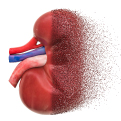
AlexLMX / iStock / Getty Images Plus
Chronic kidney disease (CKD) presents huge quality of life and economic burdens for patients and absorbs enormous healthcare resources. With at least 50 million Americans at risk for developing this progressive disorder, strategies to better identify patients before they face dialysis or renal replacement are essential. A scientific session on August 8 at the 71st AACC Annual Scientific Meeting & Clinical Lab Expo, Removing Laboratory Barriers to Improve Kidney Disease Testing and Diagnosis (35104) will bring specialists and an individual living with CKD together to discuss the most optimal test protocols.
This session evolved from the National Kidney Foundation’s (NKF) laboratory engagement plan to better diagnose CKD. This disease often progresses silently, according to session moderator Lakshmi Ramanathan, PhD, chair of AACC’s Science and Practice Core Committee. “By the time patients are diagnosed, the damage is pretty extensive,” she said. NKF surveys have illustrated the cost and health implications of CKD, the effects of which are particularly devastating in patients with diabetes and hypertension, Ramanathan told CLN Stat.
AACC has endorsed NKF’s engagement plan, featuring its priorities in a Clinical Chemistry Q&A article. The moderator of this article, Greg Miller, PhD, professor of pathology at Virginia Commonwealth University in Richmond, and one of the featured experts, nephrologist Joseph Vassalotti, MD, NKF’s chief medical officer, will be presenting at the AACC Annual Scientific Meeting session.
Vassalotti will be discussing not only NKF’s Kidney Profile Test, an approach that combines the estimated glomerular filtration rate (eGFR) and urine albumin-creatinine ratio (ACR), but also the impact of CKD on patients and the overall healthcare system. NKF’s Laboratory Engagement Plan includes an algorithm that uses Kidney Profile results to stage CKD and guide patient management, said Ramanathan, a member of the NKF Laboratory Engagement Advisory Group. Several labs and some hospitals have already adopted the Kidney Profile as recommended by NKF, she noted.
Miller will discuss laboratory barriers in CKD detection and monitoring, offering a thorough perspective on the advantages and disadvantages of different tests. A third speaker, David Rosenbloom, will discuss his perspective on living with CKD. Rosenbloom was diagnosed with end-stage renal disease at age 57 and underwent hemodialysis for a number of years before receiving a successful kidney transplant at age 63. Today at age 73, he continues to live with stage 3 CKD but has a fully active life. His personal health story “further illustrates the importance of diagnosing CKD early, using relatively simple lab tests,” noted Ramanathan.
Clinical labs oftentimes feel like the unheralded workers in patient care. “We are always behind the scenes—the patient never sees us,” she said. Inviting a patient to come to the meeting and talk about this disease underscores an appreciation for labs and the work they do, Ramanathan added.
Removing Laboratory Barriers to Improve Kidney Disease Testing and Diagnosis will take place from 10:30 a.m. to noon August 8 at the 71st AACC Annual Scientific Meeting & Clinical Lab Expo ;in Anaheim, California. Learn all about the latest in CKD testing solutions and earn 1.5 ACCENT credit hours.